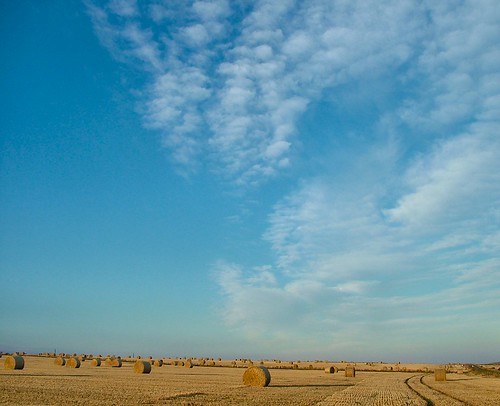The Green Isle of the Great Deep
If you type “The Green Isle of the Great Deep” into Google this blog comes out at the top of the list. To be honest I find that a bit spooky, as of course it is named after the quite wonderful book of the same name by Neil M Gunn, a mystical, spiritual yet earthy novel written in the 40’s.
When setting up this blog before Christmas – which was mainly as an experiment in blog establishment, as I wanted to create the flickr Scotland blog (now fully operational and showcasing great photos from all over Scotland) – I struggled for a name. Calums Blog was a bit, well unimaginative, and I as I tend not to use Pen Names (ccgd are just my initials) anything else would be, well dishonest. I am a fairly voracious reader, with catholic tastes but clear preferences, one of which is 20th Century Scottish writers. Neil Gunn is perhaps the one author that I return to time and again. The Silver Darlings is perhaps his best known, and most mainstream novel, but nonetheless a most wonderful piece of prose. This is what Wikipedia says about Gunn:-
Neil Miller Gunn (November 8, 1891 - January 15, 1973) was a prolific novelist, critic, and dramatist who emerged as one of the leading lights of the Scottish Renaissance of the 1920s and 1930s. With over twenty novels to his credit, Gunn was arguably the most influential Scottish fiction writer of the first half of the 20th century (with the possible exception of Lewis Grassic Gibbon (James Leslie Mitchell)). Like his contemporary, Hugh MacDiarmid, Gunn was politically committed to the ideals of both Scottish nationalism and socialism (a difficult balance to maintain for a writer of his time). Gunn's fiction deals primarily with the Highland communities and landscapes of his youth, though the author chose (contra MacDiarmid and his followers) to write almost exclusively in English rather than Scots or Gaelic (a language he lamented never having learned).
In later years his writings were heavily influenced by Zen, indeed his final work was a discursive autobiography entitled The Atom of Delight, which I cannot read but be reminded of a Caithness version of “Zen and the Art of Motorcycle Maintenance”. But the Green Isle of the Great Deep is perhaps is most thoughtful (and now dated) work. A sequel to the novel “Young Art and Old Hector” it starts when when Old Hector takes Young Art on a poaching trip and the two accidentally tumble into the depths of a salmon pool. They wake to find themselves in a bright yet strangely brittle countryside, not unlike their own but with an eerie, nightmarish quality. They are in fact in heaven, but a land where God is distracted, and men have taken over, running paradise with control, order and a search for “systems”. It’s an obvious allergy for fascism (and Stalinism) which explores some of the same themes as Orwells 1984.
Unlike Orwell though the story has a happy ending with the unlikely adventurers, who cherish creativity and free will above all else, overcoming the forces of mindlessness and order, and through their struggle discover the true meaning of freedom. A weird book, it has some great prose, not least where Old Art describes heaven as being like the view of the Black Isle from behind Conon “where the fine farms slope to the sea, and you see the mountains far away beyond the gleaming firth. I thought it very beautiful in Autumn….”
Just like the above photo then.
All in all it’s a very Highland take on heaven, tolitarianism Zen and the wee guy winning against the overpowering power of the state, by asking God for a audience. If only it was that simple......
A good read, highly recommended.

You ever read Gunn's "Sun Circle"? I think that's my favourite - I liked the Silver Darlings, but was particularly interested that Sun Circle was set in Pictish times, about which so little seems known.
Posted by Anonymous |
8:57 PM
Anonymous |
8:57 PM
I have read them all, but the three I return to time and time again are TGIOFTD, Silver Darlings and Highland River - again great great prose.
Posted by Calum |
9:26 PM
Calum |
9:26 PM
It's now on my list.
Posted by Anonymous |
11:18 AM
Anonymous |
11:18 AM